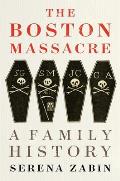“A number of Soldiers with their Baggage landed”
On Monday, 12 Mar 1770, Bostonians assembled for a town meeting to elect officers for the coming year and transact other business.
In fact, there was so much other business that that meeting kept going by adjournment for over two weeks, with sessions starting:
I rather doubt “Sixty Men” came over from Castle William all at once on 26 March, but there might well have been dozens. In her new book The Boston Massacre: A Family History, Serena Zabin discusses this moment in the context of the soldiers’ families who came to Boston and were left behind when the regiments were moved to the Castle.
The army soon stopped renting buildings for barracks, which meant some of those families would lose their homes, perhaps at the end of the month. In other cases, the wives and children were living in quarters they rented themselves. There appears to have been a scramble for new places to live. That might have been why so many soldiers came into town.
Some women ended up squatting in a building with no fireplaces. The wives of two of the soldiers jailed for the Massacre, Pvts. Edward Montgomery and James Hartigan, stayed behind in Boston while most of the 29th was sent south. We know about those vivid details because of Boston’s custom of “warning out” strangers so they wouldn’t become legal burdens. A few actually did end up in the poorhouse, but most managed to join their husbands or support themselves, which meant they didn’t reappear on town records.
To hear more about The Boston Massacre: A Family History, check out this video of Serena Zabin’s talk at the beginning of this month at the Massachusetts Historical Society.
In fact, there was so much other business that that meeting kept going by adjournment for over two weeks, with sessions starting:
- Monday, 12 March, 3:00 P.M.
- Tuesday, 13 March, 9:00 P.M. [sic]
- Friday, 16 March, 9:00 A.M.
- Monday, 19 March, 9:00 A.M.
- Monday, 26 March, 9:00 A.M.
- [intervening meeting to tidy up some items]
- Tuesday, 27 March, 4:00 P.M.
The Town having been informed by several Persons that a number of Soldiers with their Baggage landed Yesterday at Wheelwrights Wharff—one Gentleman supposing that there was not less than Sixty Men—Voted, thatIn fact, Henshaw, Jackson, and Mason were selectmen. Molineux was the Whigs’ leader on resistance to the troops, and also manager of properties on Wheelwright’s Wharf that the army had rented. Goldthwait (1710-1782) was Suffolk County registrar of deeds, having served Boston as town clerk, as selectman, and otherwise. (It’s striking I haven’t mentioned him before, only his young namesake who died from a fireworks injury. Here’s registrar Goldthwait as painted by John S. Copley.)
Mr. William Mollineux
Joshua Henshaw Esq.
Joseph Jackson Esq.
Mr. Jonathan Mason
Ezekiel Goldthwait Esq.
be a Committee to make enquiry from time to time, whether any more Troops came up from Castle Island than they think necessary, and if they shall find it to be otherwise, that they then immediately acquaint the Selectmen in order for their calling a Meeting of the Inhabitants
I rather doubt “Sixty Men” came over from Castle William all at once on 26 March, but there might well have been dozens. In her new book The Boston Massacre: A Family History, Serena Zabin discusses this moment in the context of the soldiers’ families who came to Boston and were left behind when the regiments were moved to the Castle.
The army soon stopped renting buildings for barracks, which meant some of those families would lose their homes, perhaps at the end of the month. In other cases, the wives and children were living in quarters they rented themselves. There appears to have been a scramble for new places to live. That might have been why so many soldiers came into town.
Some women ended up squatting in a building with no fireplaces. The wives of two of the soldiers jailed for the Massacre, Pvts. Edward Montgomery and James Hartigan, stayed behind in Boston while most of the 29th was sent south. We know about those vivid details because of Boston’s custom of “warning out” strangers so they wouldn’t become legal burdens. A few actually did end up in the poorhouse, but most managed to join their husbands or support themselves, which meant they didn’t reappear on town records.
To hear more about The Boston Massacre: A Family History, check out this video of Serena Zabin’s talk at the beginning of this month at the Massachusetts Historical Society.


No comments:
Post a Comment